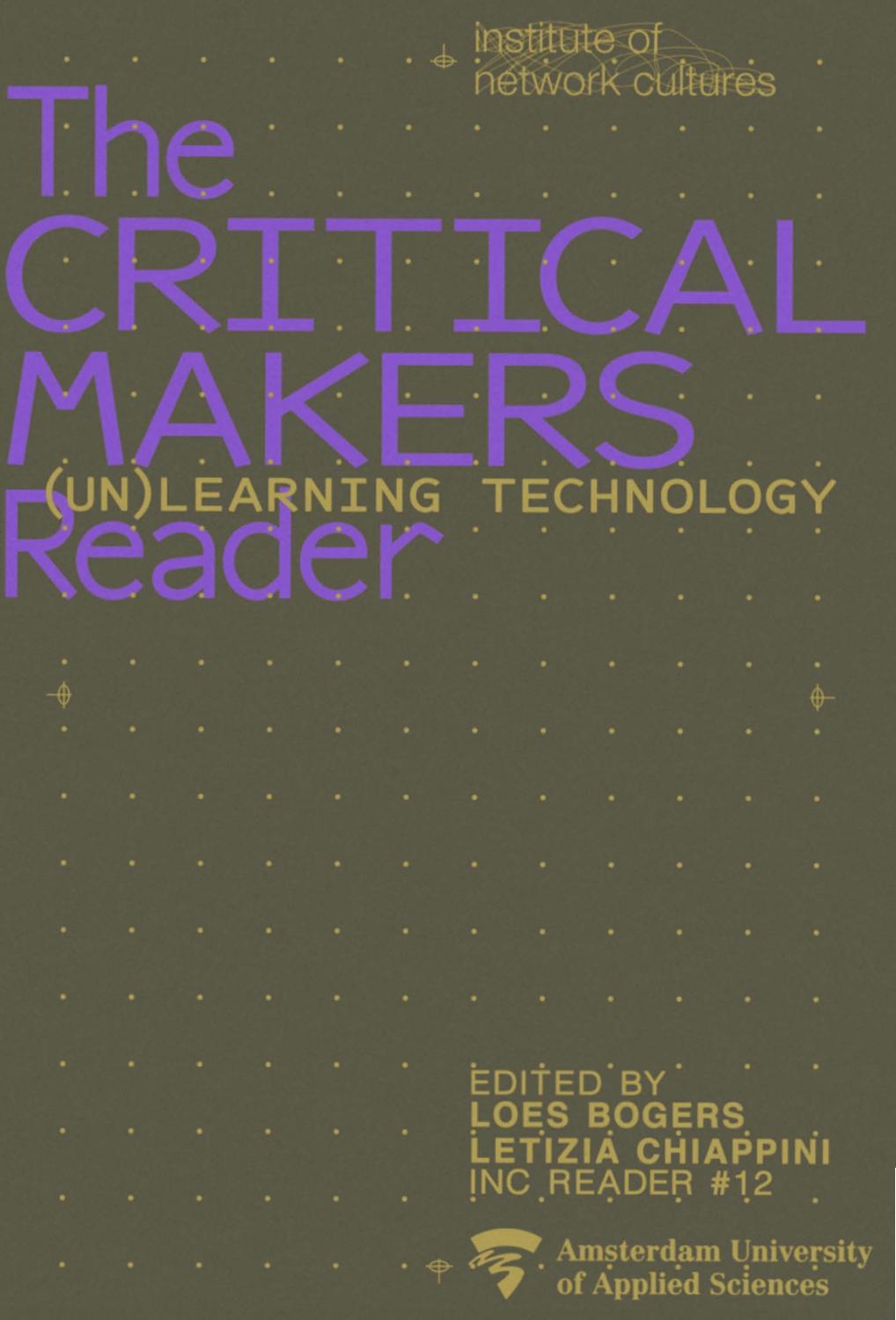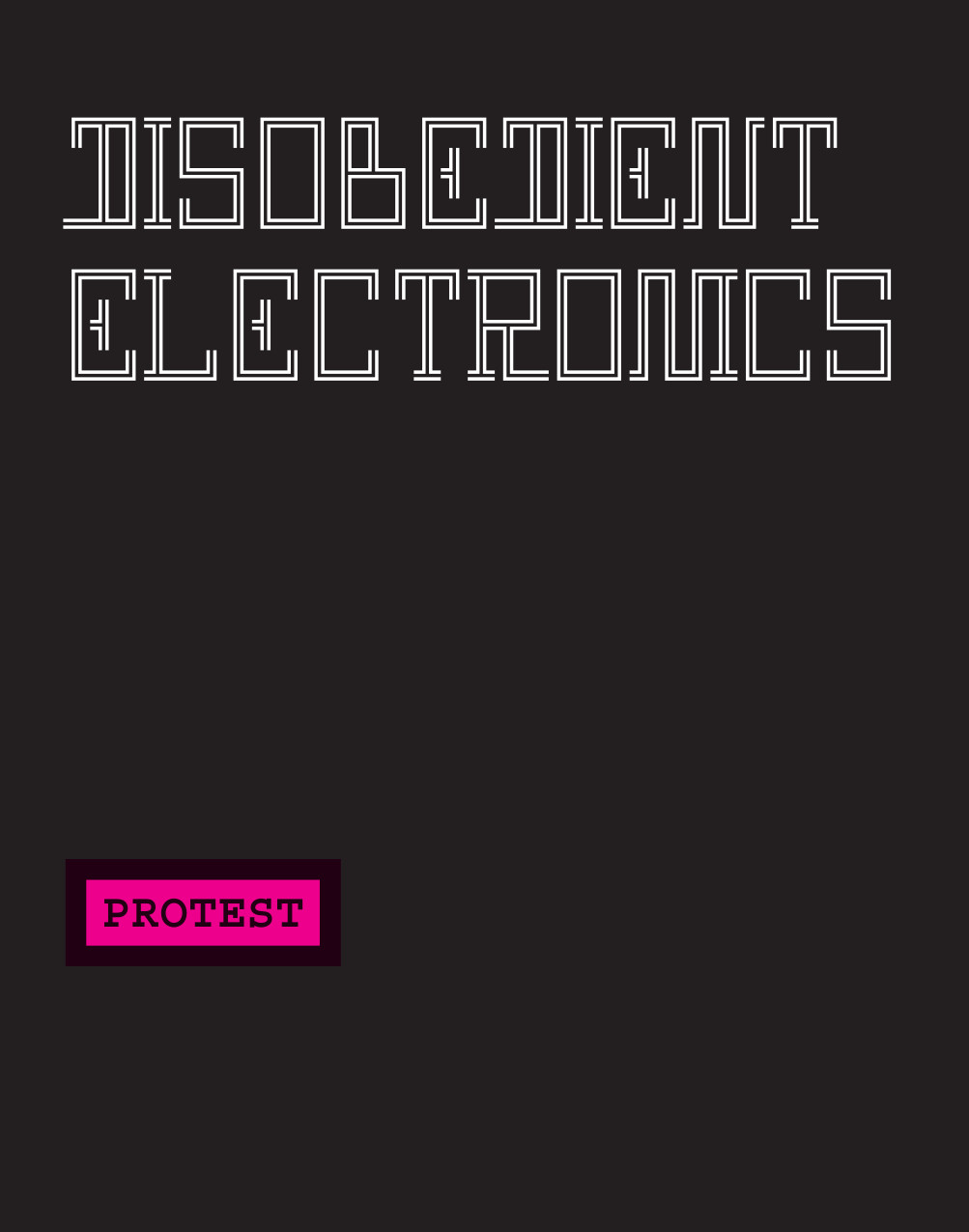Loes Bogers, Letizia Chiappini (eds.): The Critical Makers Reader: (Un)learning Technology (2019)
Filed under book | Tags: · 3d printing, critical making, maker culture, media labs, repair, technology

“A decade ago many gushed at the possibilities of 3D printers and other DIY tech. Today makers are increasingly shaking off their initial blind enthusiasm to numerically control everything, rediscovering an interest in sociocultural histories and futures and waking up to the environmental and economic implications of digital machines that transform materials. An accumulation of critique has collectively registered that no tool, service, or software is good, bad, or neutral—or even free for that matter. We’ve arrived at a crossroads, where a reflective pause coincides with new critical initiatives emerging across disciplines.
What was making? What is making? What could making become? And what about unmaking? The Critical Makers Reader features an array of practitioners and scholars who address these questions. Together, they tackle issues of technological making and its intersections with (un)learning, art and design, institutionalization, social critique, community organizing, collaboration, activism, urban regeneration, social inequality, and the environmental crisis.
Contributors: Kat Braybrooke, Abigail Browning, xtine burrough, Serena Cangiano, David Cole, Critical Media Lab, Maria Dada, Sharon Ede, Lori Emerson, Gareth Foote, Bernhard Garnicnig, Krystin Gollihue, Anja Groten, Xin Gu, Graham Harwood, Deanna Herst, Garnet Hertz, KairUs, Tom Keene, Cindy Kohtala, Verena Kuni, Maya Livio, Benjamin Matthews, Wim Nijenhuis, Paul O’Neill, Samantha Penn, Hannah Perner-Wilson, Matt Ratto, Pip Shea, Caroline Sinders, Lucy HG Solomon, Peter Troxler, Grace Van Ness, and Eva Verhoeven.”
Publisher Institute of Network Cultures, Amsterdam, Nov 2019
INC Reader series, 12
Creative Commons BY-NC-ND 4.0 International License
ISBN 9789492302366
320 pages
PDF, PDF (17 MB)
EPUB, EPUB (16 MB)
Making & Breaking, 1: Cultural Production and Social Change (2019)
Filed under journal | Tags: · critical making, cultural production

“The first issue of Making & Breaking delves into questions on the role of cultural production as a contributing force for emancipatory social transformation. This is an urgent and difficult question today, given the ways through which much cultural production lubricates neoliberal operations since the 1980’s (especially it’s spurring of inequality); including the plight of critical practices whose modes of antagonism are frequently subsumed. As a result of decades-long policies, many systems of cultural production increasingly mirror or inadvertently participate in ideological machines supporting the status quo, foreclosing on just resource distribution, human well-being, not to mention our very planet.
It is against these tendencies that Making & Breaking probes modes of cultural production that engage with questions of social transformation. How can our current models for understanding art and cultural production be refashioned, and reconceived to live up to the claims of contributing to debates on social betterment? How can they help to redirect libidinal energies, that are often today co-opted by what Mark Fisher termed digital machines of “consciousness deflation”, to take on new formulations of futural desire and attachment? How does the category of human experience figure in our global plight, in view of the impersonalization that comes with increasing complexity?
In the first issue of Making & Breaking artists, curators and theorists reflect on these questions across a wide spectrum of cultural production and geographies.” (from the Introduction)
Contributions by Dulcie Abrahams Altass, Benjamin Busch, Florian Cramer, Katherine Cross, Max Dovey, Rhian E. Jones, Arjen Mulder, and Patricia Reed.
Edited by Sebastian Olma and Patricia Reed
Publisher Centre of Applied Research for Art, Design and Technology (Caradt), Avans University, January 2019
Disobedient Electronics: Protest (2017)
Filed under zine | Tags: · critical making, design, disobedience, electronics, engineering, industrial design, technology, wearable computing

Disobedient Electronics: Protest “highlights confrontational work from industrial designers, electronic artists, hackers and makers from 10 countries that disobey conventions. Topics include the wage gap between women and men, the objectification of women’s bodies, gender stereotypes, wearable electronics as a form of protest, robotic forms of protest, counter-government-surveillance and privacy tools, and devices designed to improve an understanding of climate change.”
Edited by Garnet Hertz
Self-published in Vancouver, 2017
PDF edition, January 2018
58 pages
via fcr

